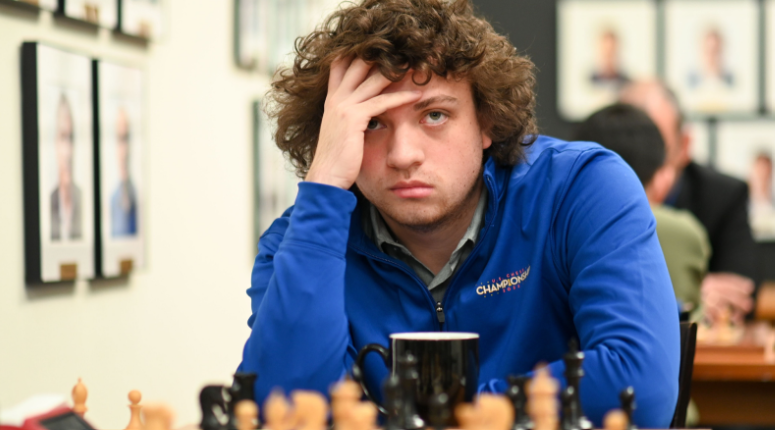Chess Cheating Scandal
November 29, 2022
Starting in early September, an alleged-cheating scandal is none other than the thousand-year-old game of chess took the world by storm. During the Sinquefield Cup, a chess tournament in Saint Louis, Missouri, 19-year-old Junior Grandmaster Hans Niemann decisively beat the five-time and current World Chess Champion, Magnus Carlsen, with the black pieces. Recently, Hans Niemann has been on an incredible rating climb—rating being the World Chess Federation’s (aka FIDE’s) measurement for projected performance—gaining over 250 points since the start of 2020 and earning his Grandmaster title. However, coming off of a lackluster performance (7.5 points out of 26 games in a rapid time format, 15 minutes) in the FTX Crypto Cup in Miami, Florida, very few expected Niemann’s win over the world champion. Moreover, before this game and starting in 2011 Magnus Carlsen had only lost 19 games in classical time format (90 minutes, with an additional 30 minutes on move 40 and 30 seconds every move) while playing with the white pieces to a select 15 players. That being said, the day that he was defeated, many just considered Niemann’s win a massive upset.
The following day, Carlsen failed to appear at his game, releasing a video of Portuguese Football Manager José Mourinho saying, “I prefer really not to speak; If I speak I am in big trouble, and I don’t want to be in big trouble,” announcing that he was withdrawing from the tournament, and effectively accusing Niemann of foul play during their game.
Naturally, this lit the chess world on fire—creating a vehement dichotomy between those who believed Magnus and those who did not. Those in the world champion’s favor denounced Niemann for his former cheating on chess.com, a popular chess website, as well as his lackluster interview following the game, while the opposing side condemned Magnus for using his prominent position in the chess community to ruin an upcoming player. Moreover, the subsequent interviews and games done by Hans for the rest of that tournament were blown up—any comments on the controversy from any notable chess player or streamer consistently broke hundreds of thousands of views on media-sharing platforms, and live chats were constantly brimming with debates.
Additionally, after Magnus’ vague statement many were still unsure if he was accusing the junior at all. Before this tournament, Magnus had announced that he was not going to defend his position as world champion—a decision almost no previous players have made—due to a complete lack of motivation. Moreover, after winning the FTX Crypto Cup a month earlier, taking home $25,000, no one was entirely sure if he intended to go all out, especially because Magnus is known for occasionally playing more dubious openings. Therefore at the time of the withdrawal, some wondered if Magnus had just quietly gone home, knowing well that he would receive backlash for withdrawing regardless of the reason.
However, during the Julius Baer Generation Cup, an online chess tournament, Niemann and Carlsen had a rematch, Niemann playing as white and Carlsen playing as black. The moves are as follows:
- d4 Nf6
- c4, 1–0
Magnus Carlsen doubled down—he resigned after playing one move.
Officially confirming the suspicions, by the end of September, Carlsen released a formal statement on Twitter accusing the 19-year-old of cheating during his and others’ games. He called Niemann out for cheating more than he had admitted, made it abundantly clear that he refuses to play both Neimann and other formerly banned cheaters, and summed up by stating that, legally, that is all he can say.
A week later, on October 4, chess.com released a 72-page report fully detailing Niemann’s cheating on the website, ranging from his previous bans in 2015 to 2020. Moreover, they compare his abnormal growth in strength/rating over the board to other juniors—some of whom are already playing at the top level—as well as his accuracy (i.e. a measurement of similarity between the moves made and the best moves, as determined by a chess computer) compared to confessed cheaters. Lastly, “[w]hile it says Niemann’s improvement has been ‘statistically extraordinary,’ Chess.com noted that it hasn’t historically been involved with cheat detection for classical over-the-board chess, and it stopped short of any conclusive statements about whether he has cheated in person” (The Wall Street Journal 2022).
While the chess community stayed aflame due to odd, increasingly risque, and ludicrous rumors about his possible cheating, Hans Niemann put together and announced his lawsuit against Magnus Carlsen, chess.com and chess.com owner Daniel Rensch, and chess streamer Hikaru Nakamura, accusing them all of slander, libel, violation of the Sherman Act, tortious interference with contract and business expectancies, and civil conspiracy. Overall, Niemann is seeking $100,000,000 in damages, claiming that the accused’s actions have done irreparable damage to his career, reputation, and livelihood.
Since then there has been radio silence—Magnus, chess.com, and Nakamura have yet to respond and the lawsuit still stands. Many have said the lawsuit will be a tough win, e.g. Bloomberg Opinion Columnist and Yale Professor of Law Stephen L. Carter wrote about it:
[Niemann will] have to show not just that Carlsen and the other defendants said something that wasn’t true, but that they did so out of malice, often defined to include a reckless disregard for truth or falsity. That’s a tough demand, given Niemann’s own admitted previous conduct. (Carter 2022)


